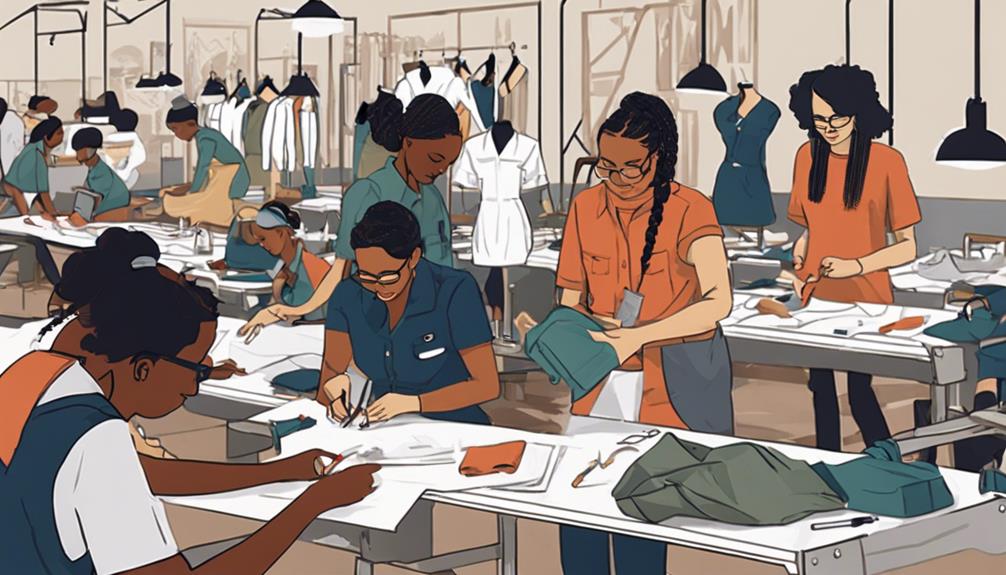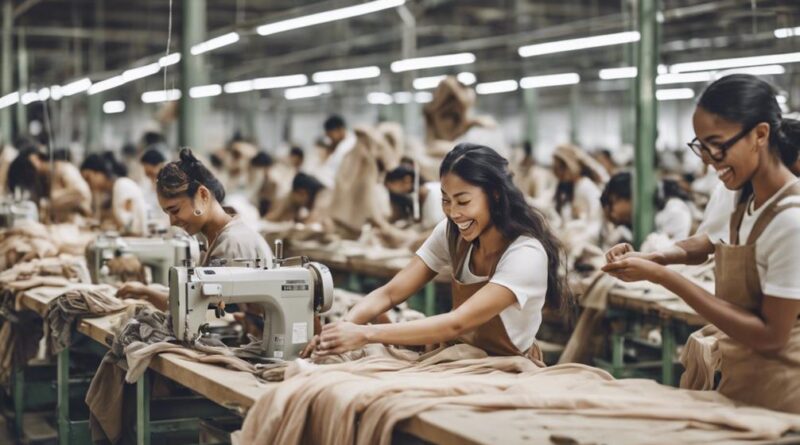3 Best Practices for Ethical Labor in Fashion
Imagine a bustling atelier where skilled hands craft exquisite garments, each stitch a testament to dedication and artistry. But behind this façade of beauty lies a complex web of labor practices, some less savory than others.
How can you ensure that the clothes you love are made ethically? By exploring three key practices in the fashion industry that prioritize the well-being of those who bring your favorite designs to life.
Let's navigate this ethical landscape together for a more conscious sartorial journey.
Implement Fair Wages and Benefits
When setting fair wages and benefits in the fashion industry, ensure that every worker receives compensation that reflects their contributions. Salary equality is crucial to maintain a harmonious work environment where all employees feel valued. By establishing transparent salary structures based on job roles, experience, and performance, you can uphold fairness and prevent disparities. This practice fosters a sense of equity among workers, boosting morale and productivity across the board.
In addition to salary equality, designing comprehensive benefit packages is essential for promoting employee well-being. Benefits such as health insurance, paid time off, and retirement plans demonstrate your commitment to supporting staff members beyond their basic pay. When crafting these packages, consider the diverse needs of your workforce to provide meaningful perks that enhance their overall quality of life. By offering competitive benefits, you not only attract top talent but also retain experienced employees who value long-term security.
Striking a balance between fair wages and attractive benefits is key to building a sustainable labor model in the fashion industry. Remember that investing in your workers' financial stability and overall welfare not only benefits them individually but also contributes to the success and reputation of your brand. Prioritize salary equality and robust benefit packages to create a positive work environment where employees feel respected, motivated, and engaged.
Ensure Safe Working Conditions
To maintain ethical labor practices in the fashion industry, prioritize the implementation of safe working conditions for all employees. Ensuring a safe work environment not only protects the well-being of your staff but also contributes to a more sustainable and responsible industry overall.
- Improve Ventilation: Proper ventilation is crucial in garment factories to reduce the risk of exposure to harmful fumes and particles. Implementing systems that improve air circulation can significantly enhance the quality of the working environment.
- Enhance Lighting: Adequate lighting is essential to prevent eye strain and improve overall productivity. Well-lit workspaces also contribute to a safer environment by reducing the likelihood of accidents or injuries.
- Regular Safety Inspections: Conducting routine safety inspections helps identify potential hazards and ensures that safety protocols are being followed. Addressing issues promptly and proactively can prevent accidents and promote a culture of safety within the workplace.
Embrace Transparency in the Supply Chain
Embracing transparency in the supply chain is essential for ensuring accountability and ethical sourcing practices in the fashion industry. By increasing accountability and enhancing supply chain visibility, brands can better monitor their operations and ensure that ethical standards are being met at every stage of production. Transparency allows consumers to make informed choices about the products they buy, fostering trust and loyalty towards brands that prioritize ethical labor practices.
One way to increase accountability is by disclosing information about suppliers, factories, and production processes. By sharing this data, brands demonstrate their commitment to transparency and invite scrutiny that can help identify areas for improvement. Supply chain visibility involves tracking the journey of materials and products from sourcing to distribution, enabling brands to address any issues related to labor conditions, environmental impact, or quality control promptly.
Implementing transparency measures also helps companies detect and prevent unethical practices such as forced labor, child labor, or unsafe working conditions within their supply chains. Brands that prioritize transparency signal to consumers that they take responsibility for their entire production process and are willing to be held to high ethical standards. Ultimately, embracing transparency in the supply chain not only benefits workers and the environment but also strengthens the reputation and credibility of fashion brands in the eyes of consumers.
Support Workers' Rights to Organize
Increase the ethical impact of your supply chain by actively supporting workers' rights to organize within your fashion brand. Promoting collective bargaining and advocating for worker empowerment are essential steps in creating a fair and just work environment for all employees.
Here are three key ways you can support workers' rights to organize:
- Educate Your Team: Ensure that all employees, from management to frontline workers, understand the importance of workers' rights to organize. Provide training sessions or workshops to raise awareness about collective bargaining and how it can benefit both the workers and the company.
- Create Safe Spaces: Establish safe spaces where employees feel comfortable discussing their concerns and exploring the possibility of forming a union or organizing. Encourage open communication and assure workers that their rights will be respected and protected.
- Respect Collective Decisions: If your employees choose to form a union or engage in collective bargaining, respect their decisions and work collaboratively with the union representatives. Recognize the union as a legitimate voice for the workers and engage in good faith negotiations to address their concerns.
Promote Gender Equality in the Workplace
Promoting gender equality in the workplace is crucial for fostering a fair and inclusive environment for all employees. By empowering women and promoting diversity, fashion companies can create a more equitable and supportive work environment.
To empower women in the fashion industry, it's essential to provide equal opportunities for growth and advancement. This includes ensuring that women have access to leadership positions, equal pay for equal work, and a work culture that values their contributions. By actively promoting women into leadership roles, companies can benefit from diverse perspectives and strengthen their overall performance.
Additionally, promoting diversity goes beyond gender equality and encompasses inclusivity across all aspects of the workplace. Embracing diversity in terms of race, ethnicity, sexual orientation, and background can enrich the creative process and drive innovation within the fashion industry. Companies that prioritize diversity create a more welcoming environment where employees feel valued and respected for who they are.
Combat Forced Labor and Child Labor
To uphold ethical labor practices in the fashion industry, it's imperative to actively address and eliminate instances of forced labor and child labor in supply chains. These unethical practices not only violate basic human rights but also tarnish the reputation of companies involved. By combatting forced labor and child labor, you can contribute to a more sustainable and socially responsible industry.
Key Points to Remember:
- Supply Chain Transparency: Ensure transparency throughout your supply chain to trace any potential instances of forced labor or child labor back to the source.
- Implement Strict Policies: Enforce strict policies that prohibit the use of forced labor and child labor in any stage of production.
- Support Labor Rights: Advocate for and support labor rights initiatives that aim to eradicate forced labor and protect the rights of workers in the fashion industry.
Provide Training and Development Opportunities

Training and development opportunities play a crucial role in enhancing the skills and knowledge of workers in the fashion industry. By investing in continuous training programs, fashion companies can boost skills enhancement and facilitate career advancement for their employees. Providing opportunities for learning new techniques, trends, and technologies not only benefits the workers individually but also contributes to the overall growth of the company.
Employee engagement is significantly influenced by the presence of training and development initiatives. When employees feel empowered through learning opportunities, they're more likely to be engaged with their work and committed to the organization's goals. Empowering employees to expand their knowledge base and skill set can lead to increased job satisfaction and motivation.
Moreover, offering training and development opportunities demonstrates a commitment to the well-being and professional growth of employees. This, in turn, fosters a positive work environment where individuals feel valued and supported in their career progression. Companies that prioritize training and development tend to attract and retain top talent, as employees recognize the potential for personal and professional growth within the organization.
Collaborate With Ethical Certifications
Enhancing ethical labor practices in the fashion industry involves collaborating with reputable ethical certifications to ensure transparency and accountability in supply chains. Certification partnerships play a crucial role in verifying that the products are made under fair working conditions and meet ethical standards. By working with these certifications, fashion brands can showcase their commitment to responsible sourcing and production practices.
Key Points:
- Verification of Ethical Standards: Ethical certifications help verify that labor practices within the supply chain meet specific standards, such as fair wages, safe working conditions, and no child labor.
- Consumer Trust: Collaborating with ethical certifications enhances consumer trust by providing assurance that the products are ethically produced, encouraging more sustainable purchasing decisions.
- Industry Recognition: Brands that partner with reputable ethical certifications gain industry recognition for their commitment to ethical labor practices, setting them apart as leaders in responsible fashion.
Frequently Asked Questions
How Can Fashion Brands Ensure That Their Suppliers Are Paying Fair Wages and Providing Adequate Benefits to Their Workers?
To make sure suppliers pay fair wages and offer good benefits, you should check for fair trade certifications and demand transparency. Encourage worker empowerment and hold suppliers accountable for their actions.
What Measures Can Be Taken to Prevent Unsafe Working Conditions in the Fashion Industry?
To improve worker safety in the fashion industry, you need to prioritize monitoring factory conditions. Regular inspections, proper training, and enforcing safety protocols are essential steps.
Make sure all equipment is well-maintained, provide protective gear, and establish emergency procedures. By actively monitoring and addressing potential hazards, you can create a safer work environment for all employees.
Stay vigilant and responsive to ensure a culture of safety and well-being in your fashion supply chain.
How Can Fashion Brands Increase Transparency in Their Supply Chain to Ensure Ethical Labor Practices?
To increase transparency in your supply chain for ethical labor practices, start by boosting worker empowerment. Provide avenues for employees to voice concerns and ensure fair treatment.
Enhance supply chain visibility by regularly auditing facilities and tracking production processes. Implement labor rights training for all staff and partners.
Establish clear accountability measures to hold all stakeholders responsible for upholding ethical labor standards. Transparency is key to fostering trust and ensuring ethical practices throughout the supply chain.
What Are Some Effective Ways to Support Workers' Rights to Organize Within the Fashion Industry?
To support workers' rights to organize in fashion, encourage collective bargaining for fair treatment and worker empowerment. Providing a safe space for employees to voice concerns and negotiate collectively can help achieve better working conditions and fair wages.
How Can Gender Equality Be Promoted in the Workplace of Fashion Brands?
To promote inclusivity in fashion, empower women in the workplace by offering equal opportunities for leadership roles and fair pay.
Encourage open communication and create a supportive environment for all employees.
Implement policies that address gender bias and provide resources for professional development.
Conclusion
In conclusion, by implementing fair wages, ensuring safe working conditions, and embracing transparency in the supply chain, you can contribute to ethical labor practices in the fashion industry.
Supporting workers' rights, promoting gender equality, and combatting forced labor are essential steps in creating a more sustainable and ethical work environment.
Remember to provide training and development opportunities, collaborate with ethical certifications, and always prioritize the well-being of those who make our clothes.
